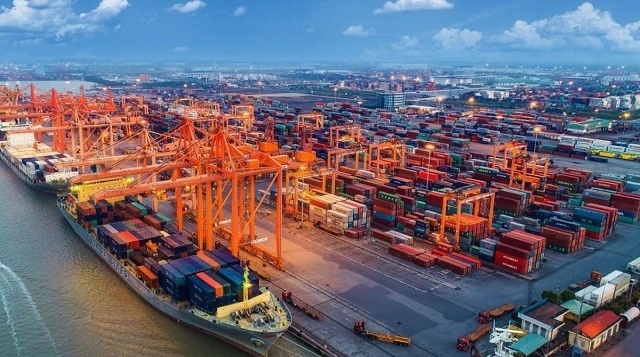VOV.VN - In order to achieve the export growth target of 6% set for 2024, businesses are required to adhere to major markets such as the United States, the European Union, Japan, the Republic of Korea, and China, according to insiders.

A primary focus on key markets
The Ministry of Industry and Trade (MoIT) has set a target of getting US$377 billion in export earnings, up 6% year on year, and running a trade surplus of roughly US$15 billion in 2024. This target is not easy to be achieved amid global uncertainties such as geopolitical tensions and risks in the Red Sea.
In fact, major markets such as the US, China, Europe, and ASEAN continue to play a decisive role in the country's export growth.
Ta Hoang Linh, director of the European - American Market Department under the Ministry of Industry and Trade, emphasised that both Europe and America remain extremely important markets for Vietnam, especially for key items like electronics, footwear, textiles, wooden furniture, and agricultural products.
In particular, 2023 was the third consecutive year in which two-way trade turnover between Vietnam and the US exceeded the US$100 billion mark. Although the US economy has been affected by the global economic downturn, leading to a decline in consumption, American buyers continue to identify the Vietnamese market as a key supplier.
Furthermore, the US is keen to diversify the supply chain, with Vietnam serving as an important link. Last year, many large US corporations, including Apple, Google, Boeing, and Walmart, continued expanding their supply chain in the country to ensure long-term stability of the entire chain globally. The lifting of Vietnam-US relations to a Comprehensive Strategic Partnership during President joe Biden’s Hanoi visit is said to create a wealth of opportunities to promote Vietnamese exports to the demanding US market.
Apart from the European and American markets, the Asia - Africa region is also important for the country's exports. Specifically, despite gloomy prospects, trade turnover between Vietnam and the Asia-Africa region still has notable bright spots. Specifically, Vietnamese exports to the region last year reached US$183 billion, equivalent to 2022, accounting for more than 51% of total Vietnamese export earnings. Some markets witnessed an increase in export turnover, such as China, up 6.2%; India, up 7.8%; Indonesia, up 13.8%; the Middle East, up 13.5%; and Africa, up 4%.
These figures indicate that businesses are taking full advantage of the existing free trade agreements (FTAs) to accelerate export growth. Deputy Minister of Industry and Trade Phan Thi Thang pointed out that while Vietnamese exports to other regions have declined, exports to the Asia-Africa region remained stable, which has in turn laid a foundation for robust export growth over the coming years.
Solutions to boost exports
Many reputable financial organisations predict that the global economy, especially countries in Europe and America, will probably see lower growth than 2023. However, these markets have all moved to raise their standards for imported goods, which has required Vietnamese suppliers to improve product quality to avoid losing orders.
Than Duc Viet, general director of Garment 10 Company, said large buyers tend to look for nearby suppliers to minimise costs, so Vietnamese businesses can still seize opportunities to secure more export orders.
With regard to the Chinese market, there are a wealth of opportunities for the country's agricultural products to enter this lucrative market. Last year saw China alone make up nearly US$12.2 billion out of Vietnam’s total agricultural export turnover of US$53 billion. Notably, China agreed to consider lifting its ban on importing poultry from Vietnam. It is also considering importing avocados, along with other products of the livestock industry, from Vietnam.
Statistics show China spent US$3.4 billion importing Vietnamese fruits and vegetables last year, and this large market is expected to open more doors for frozen vegetables and fresh coconuts.
The General Statistics Office of Vietnam recently unveiled a survey, indicating that about 24.6% of local businesses expect to increase new export orders in 2024, while 46.8% of businesses hope to secure their stable orders. About 28.6% of the respondents said their orders will fall.
The latest report recently released by the ASEAN+3 Macroeconomic Research Office (AMRO) based in Singapore said that the Vietnamese economy is forecast to grow 6% in the year ahead, largely thanks to the recovery of exports. According to AMRO, many foreign financiers remain very optimistic about the Vietnamese economy and continue to invest in the market, viewing it as an attractive investment destination to diversify the supply chain. Meanwhile, VinaCapital forecast that Vietnamese export growth would recover, from a decrease of 4% in 2023, to an increase of 7% in 2024.
However, with an export-based economy and increasingly high standards in markets, Vietnamese export industries need to continue diversifying export markets to avoid external shocks and raise product quality to secure a firm foothold in the supply chain, according to experts.














